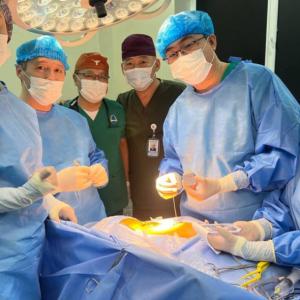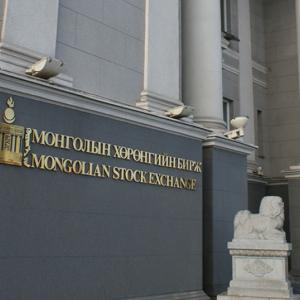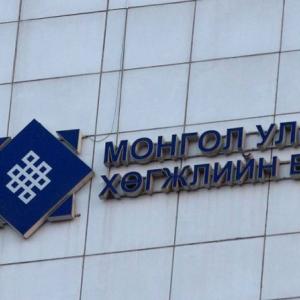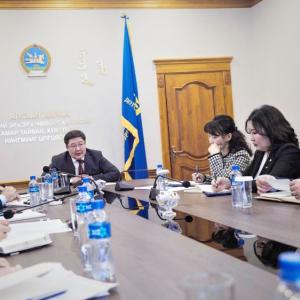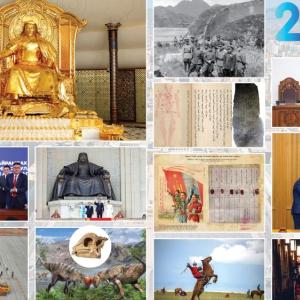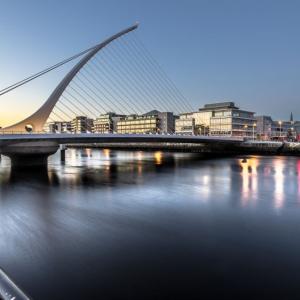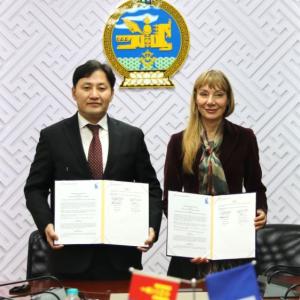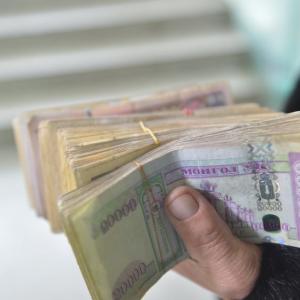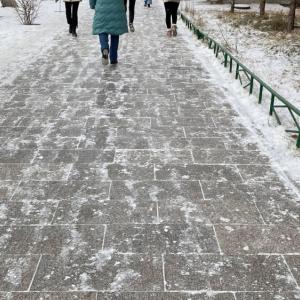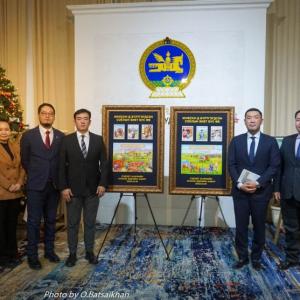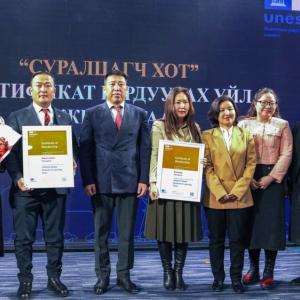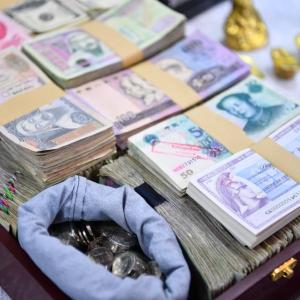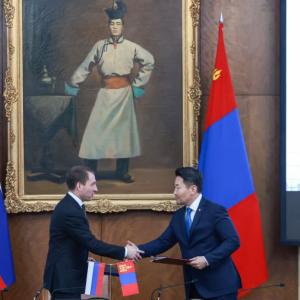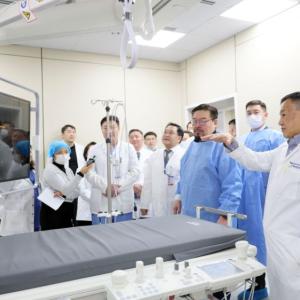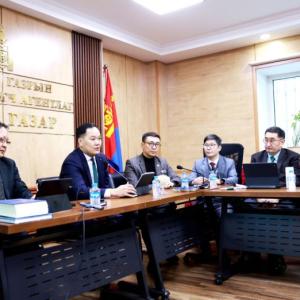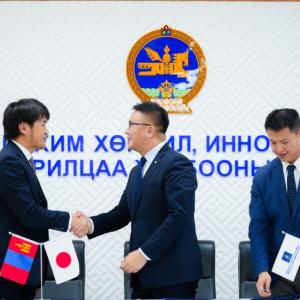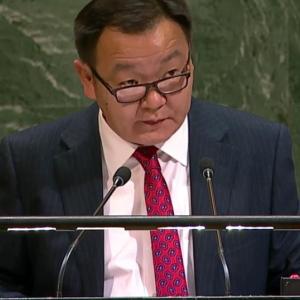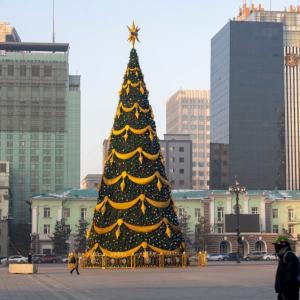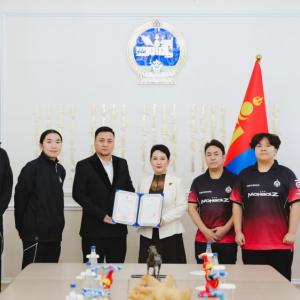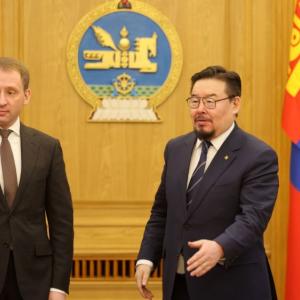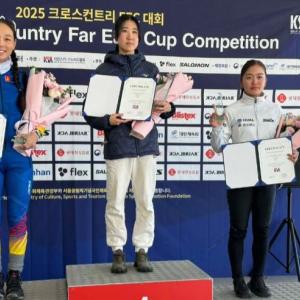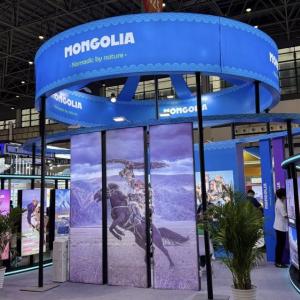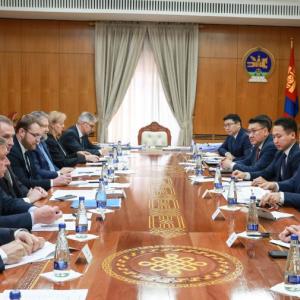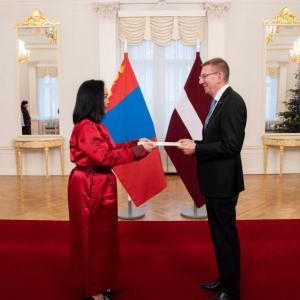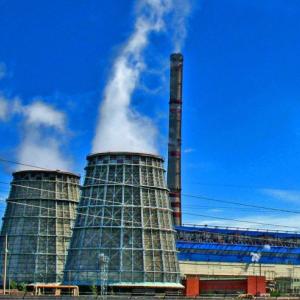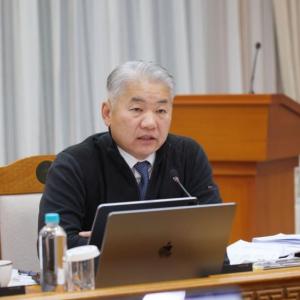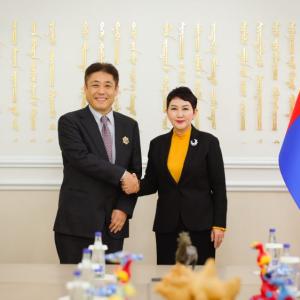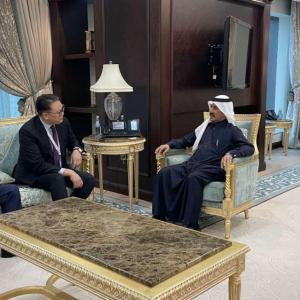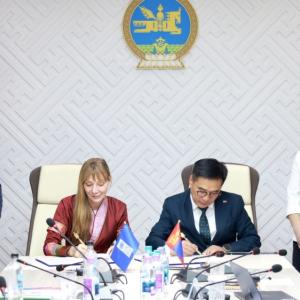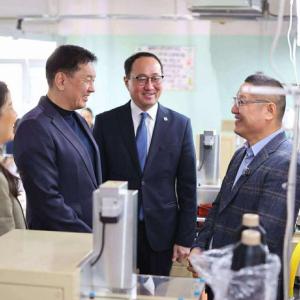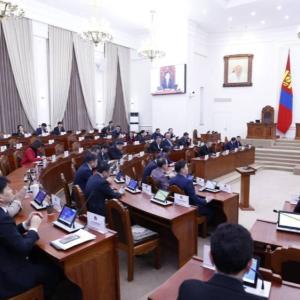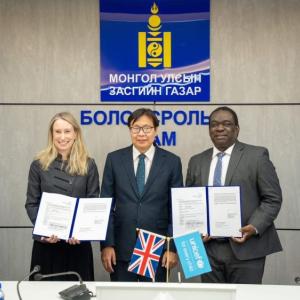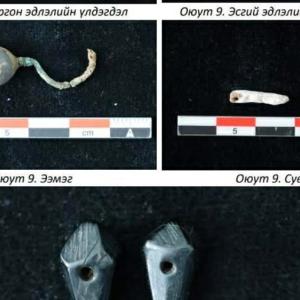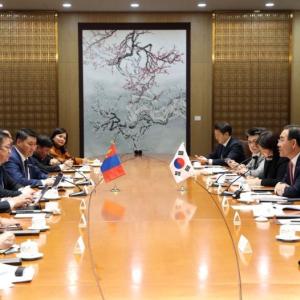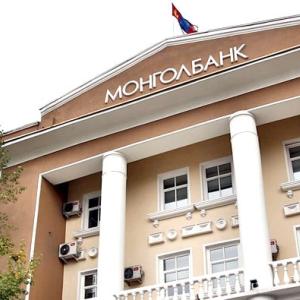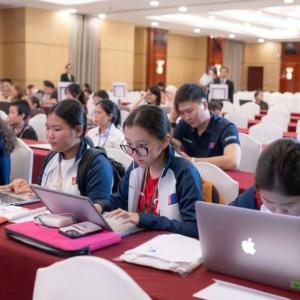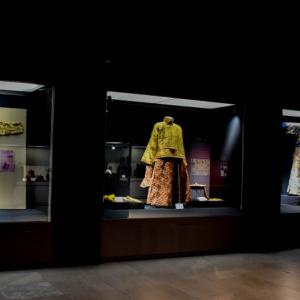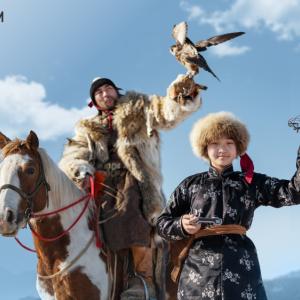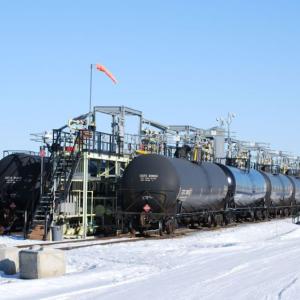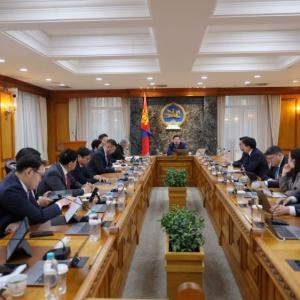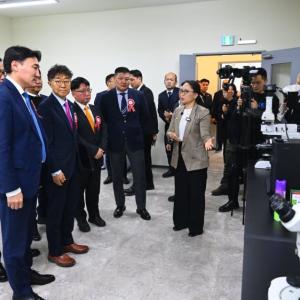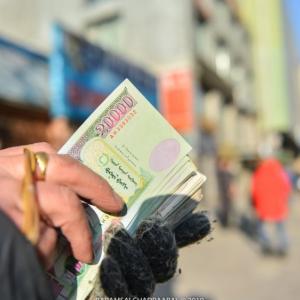Mongolia-China relations at its historic peak
The Mongol Messenger
Ulaanbaatar /MONTSAME/. On
the occasion of the 70th anniversary of the establishment of diplomatic
relations between Mongolia and the People’s Republic of China this year, Deputy
Foreign Minister B.Battsetseg gave an interview with MONTSAME
news agency.
- There have been a series of events that have taken place since the
start of the year in the framework of the 70th anniversary of the establishment
of diplomatic relations between Mongolia and the People’s Republic of China
(PRC). How do the two sides see their significance and results?
- One of the first few countries to immediately acknowledge the establishment of the new Chinese state in 1949 was Mongolia. It has
been 70 years since the two sides exchanged letters and established
diplomatic relations on October 16, 1949. This is a long period of time. In the
past 70 years, all sides of relations, realized partnership and friendship
between the peoples of our ever-neighboring two countries continuously
developed, coming over various challenges and deepening the relations.
Mongolia became
the 8th country to acknowledge the country when the new Chinese state was
established. The very first countries were led by the USSR /1949.10.03/, along with Bulgaria /1949.10.04/, Romania /1949.10.05/,
Hungary, Czechoslovakia, North Korea /1949.10.06/, and Poland /1949.10.07/.
To put it briefly, you could say that the past 70 years of relations
between Mongolia and China is a model for friendly relations and a
realized partnership for neighboring countries. Thus in 2019, we came to the
decision to mark the anniversary in a way that is accessible, easy to understand,
and beneficial for the two countries and peoples by co-organizing
various events, successfully implementing the planned events throughout the
year.
For instance, a series of events on politics, trade, and economy, and
humanitarian sectors as well as in regional partnership are being co-organized.
To name a few, in the political sector, President of Mongolia Kh.Battulga did a
state visit to the People’s Republic of China at the invitation of
President of PRC Xi Jinping in April, and attended the second Belt and
Road Forum for International Cooperation. Vice President of PRC Wang Qisan
also did a visit in Mongolia in July at the invitation of Prime Minister
of Mongolia U.Khurelsukh, as an honored guest of the
National Naadam Festival.
Furthermore, there have been many events that were organized in the
culture-humanitarian sector. In September this year, cultural days events of
China and Inner Mongolia were organized in the capital and in some parts of the
country. The events included multi-ethnic cultural performances of China,
Chinese movie days, ethnic cuisines as well as the Chinese folk arts
of paper cutting and embroidery, and the book launch of the
Mongolian translation of Chinese classic and modern literary works—a rich
series of events have taken
place.
There is a lot of significance and results of all these events. We consider all of the year-round events being organized as a significant boost to fortify the two countries’ relations, actively cooperate, enhance mutual trust, and strengthen friendly relations.
- Could you highlight events, in which Mongolia was promoted in our southern neighbor in the framework of the anniversary?
-Exchange programs for children and youth, mutual visits of the media
sector, reporting, joint scientific conferences of scholars—this year has
been full of many events and activities.
To highlight a few of the events, the Mongolia-China Expo was successfully
organized in Hohhot and Ulanqab cities of Inner Mongolia Autonomous Region,
China in early September. During the expo, various events were organized to
create new opportunities for business owners and officials in the sectors of
food, agriculture, environment, tourism and the small and medium enterprises in
aims of further developing bilateral trade and economic partnership.
The ‘Mongolian
cultural days’ events will also be organized in Beijing and several cities of
China in October. In its framework, our top performances will take place in the
cities. Photography and artwork exhibitions depicting the development, way of living,
and exquisite nature of modern Mongolia alongside events to
promote ancient and modern literary works will also be taking
place.
- The many construction works that were done with the non-refundable aid of
China during the 50s and 60s continues to be a symbol of
friendship for the two nations’ peoples. Could you highlight some of
the great moments of the friendly relations between the two countries in the
past 70 years?
- Yes, many of the infrastructure, apartment complexes, factories, and
power plants that were built through the non-refundable aid and soft loans from
PRC between 1950-1960 continues to be used even to this day. For instance, just
in Ulaanbaatar, we have the State Department Store, the Peace Bridge, Sports
Palace, the third thermal power plant, the Ulaanbaatar-Nalaikh road, and the
glass factory in Nalaikh district, while we also have many more that we could
name, such as the match factory in Selenge aimag, and an irrigation system in Kharkhorin.
I would also like to highlight that these types of construction work that
serves as a symbol of friendship is still being done in this modern time. This
includes the construction of the new Wastewater Treatment Plant, the project on
transforming the ger districts into apartment complexes, the 20.9km road
between Ulaanbaatar and Nalaikh, the highway to the airport, the flyover
crossing over the Narny Road, the 67km road between Tosontsengel and Uliastai
soums of Zavkhan aimag, the 127km road en route Bayankhongor-Gobi-Altai aimag
as well as many others. All of these projects being implemented in the
framework of the partnership are beneficial to the development of Mongolia and
the Mongolian people.
- In 2014, President of the PRC Xi Jinping did a state visit to Mongolia,
bringing the relations between the two countries to a new era of comprehensive
strategic partnership. As a result, the high-level relations between the two countries
stabilized. Would you please give information on future high-level visits?
-This year,
President of Mongolia Kh.Battulga did a state visit to the PRC in April and
attended the Second Belt and Road Forum for International Cooperation. And
during the National Naadam Festival in July, Vice President of the PRC Wang
Qisan also paid a visit to Mongolia. The two sides will continue to implement
regular high-level visits. Visits and events will continue to be organized as
according to the plan for this year.
- The aid and
investment being done by the PRC have steadily increased in the last few years.
If you could tell us more on this:
-As of 2018, investment of about USD 4.4 billion
was done in Mongolia from the PRC. There are currently over 10,000 entities of
PRC registered in Mongolia.
To mention some
of the non-refundable aids given by the PRC, the Chinese side announced the
non-refundable aid of CNY 1 billion during the state visit of the President of
the PRC Xi Jinping in 2014, and the non-refundable aid of CNY 2 billion during
the visit of Prime Minister J.Erdenebat in 2017. In the framework of the aid,
the Development Center for Children with Disabilities, the project on 1,008
household apartments, the project on enhancing the infrastructure of the border
checkpoint as well as many other large-scale projects on social development
that are beneficial to the people, such as the construction of 7 schools and 1
kindergarten are being implemented.
In
the framework of the soft loan, the sides came to the decision to implement a
total of 12 projects /2 projects with the financing of USD 300 million
and 10 projects with financing of USD 500 million were implemented/, and 11
projects with financing of USD 1 billion in 2014. For instance, the construction
project on the electric line between Ulaanbaatar and Mandalgobi and its
substation has been implemented, with projects on the construction of the
20.9km road between Gachuurt junction and Nalaikh-Choir, and the new Wastewater
Treatment Plant currently being implemented. The project on the Erdeneburen
Hydropower Plant has also been decided to be financed from this source.
-How should
Mongolia participate in the Belt and Road initiative initiated by the President
of the PRC Xi Jinping?
-The two sides
decided to have correlation between the Development Road and the Belt and Road
initiatives, signing a Memorandum of Understanding between the Government of
Mongolia and the Government of the PRC in 2017. In its framework, a joint plan
has been developed, in which the measures to be implemented have been defined.
Aside from the projects and programs to be implemented on both sides, it has
also become necessary to develop a tripartite partnership. For example, in the
case of the Program on Establishing Economic Corridor between Mongolia, China,
and Russia, we are actively working together with our two neighbors.
The sides signed the agreement on
the Program on Establishing Economic Corridor between Mongolia, China, and
Russia in June 2016. As according to the program, 32 projects on road,
transport, and infrastructure will be implemented. And for starters, we have
come to the decision to implement three important projects in the near future,
which includes the renovation of the main railway corridor, active use of the
AH-3 route of the Asian Highway network, as well as the renovation of the
energy system.
The
side of Mongolia is interested in actively participating in the construction
work being done in the framework of the Belt and Road initiative, and reach
realized results. We are currently working on matters, such as taking
initiative to create Awards for young diplomats for future peace, progress, and
prosperity to support young
diplomats’ participation for peace actions.
- What kind of advancements and new opportunities are
being made in the friendly relations between the two countries?
-Before
we talk about advancements and new opportunities for
development, we must
discuss the current level of relations and
partnership between Mongolia and China, its unique features and future
prospects. To start it off, the relations between Mongolia and China are
currently at its historic peak. From this viewpoint, you could say that the
relations and partnership between the two sides have been brought a new level.
The sides have agreed on this fact during the mutual high-level visits and
meetings.
Nurturing a
mutually beneficial and friendly relationship with the PRC is a priority of
Mongolia’s foreign policy. As eternal neighbors, we consider the relations
between the two sides having become a model relation not only in the region,
but also internationally as it has developed in a way that is mutually
beneficial for development. Currently, we are carefully observing President of the PRC Xi Jinping’s consistent development policy on
enriching the comprehensive strategic partnership with new content that fully matches the interests of our country.
The relations
of our two countries are developing at a healthy, yet fast pace. Reaching the
level of a comprehensive strategic partnership means that we are paying
attention to the relations and partnership in all sectors and all levels.
Furthermore, strategic partnership means that rather than only being limited to
high-level officials, it now covers a wider range. We could take the regional
relations and partnership near the borders of our two countries as an example.
Relations and partnership between the two countries are actively taking place
at border checkpoints and regions.
From the
development of relations between Mongolia and China, it can be clearly seen
that a small and a large country can respect each other’s interests and develop
a mutually beneficial partnership.
Giving special significance to the relations with neighboring countries, the Government of China’s policy on being friendly and open, and sharing the benefits of the partnership is creating the opportunity to develop bilateral relations on a wider scale. We are currently observing and supporting how President of the PRC Xi Jinping’s principle to be “genuine, open, and accessible” fully matches with the interests of neighboring countries, such as our country.
An important
part of our bilateral relations is the partnership in trade and economy. With
the trade turnover between the two countries steadily increasing in the past 20
years, it is great that the trade turnover in 2017 was double the amount of
2010. As for the investment partnership, the Chinese side takes a large
portion. Currently, China ranks second for the countries that have made
investments to our country.
In the framework of reaching the goal of having the trade turnover reach
USD 10 billion in 2020, special significance is being given to enhancing trade
structure, diversifying export and increasing the amount of export for
value-added products, especially that are of the agricultural and non-mining
sectors.
S.Munkhbaatar
 Ulaanbaatar
Ulaanbaatar

















